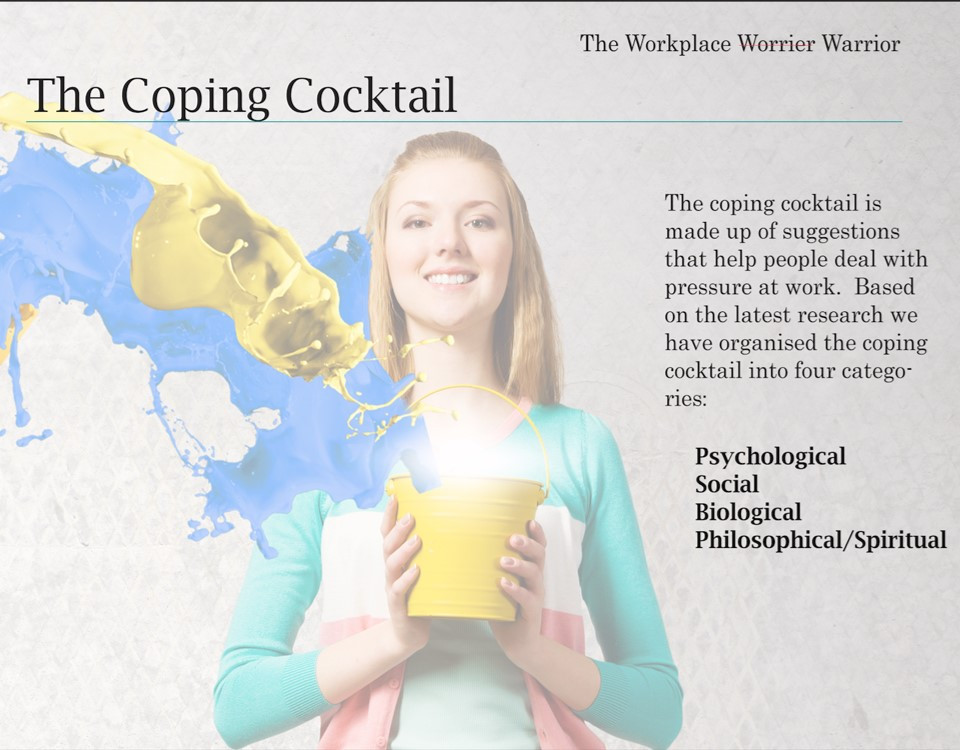
Introduction
A positive response to overcoming negative stress and becoming more resilient in certain situations would be to change the way we think or to change the way we act. Our feelings are a response to these thoughts and behaviours, they are the effect, but they are not the cause.
The coping cocktail is made up of suggestions that help people deal with pressure at work as well as outside of work. We have spent a lot of time exploring the psychological element of the coping cocktail and how it plays a huge role in the way we view and perceive our lives. This section will briefly look at other strategies within the coping cocktail. I call it a cocktail because it's often not just one change that makes the difference but a combination of thinking and acting more positively.
The four elements in the coping cocktail are; Phycological, Social, Biological, and Philosophical. I have also added time management as these habits have a large impact within work environments. Let us briefly look at some tips around the rest of these elements.
Phycological
Please contact us for a free copy of the eLearning module for the learning part of this element.
If you a position of leadership here are some tips to help you build on this phycological support element.
Social Support
Research overwhelmingly suggest that getting the support of others is one of the best ways of coping with stress. “A problem shared is a problem halved”. Kelly McGonigal is a health psychologist and lecturer at Stanford University who is known for her work in the field of 'science help' which focuses on translating insights from psychology and neuroscience into practical strategies that support health and well-being. In her book ‘The Upside of Stress’ McGonigal highlighted the importance of connection during times of stress.
Within a work environment the most influential support is that of a direct line manager, followed by a colleague as these people will often recognise what you are experiencing. Often during times of stress, we can find ourselves withdrawing, fearful of appearing to be weak, vulnerable or embarrassed. Open up, seek support, and express how you are feeling to those you can trust.
If you a position of leadership here are some tips to help you build on this social support element.
Biological Support
Our biology has a massive impact on our being. During times of stress we can potentially find ourselves indulging in the wrong behaviours which offer short term relief but ultimately can be harmful. As discussed already in this workshop the process of oscillation is important. Taking breaks helps up be more productive which in turn helps us with our time management and acute stress levels. The most obvious biological behaviours that will impact our state include our diets, exercise habits, and sleep.
There is a lot of information around that cover these areas in great depth. If your struggling to improve in these areas, as many do, consider getting some support, either from friends or if you can afford it from professionals like personal trainers or nutrition experts.
If you a position of leadership here are some tips to help you build on this biological support element.
Philosophical Support
Have you every heard of a BHAG? It stands for a Big Hairy Audacious Goal. I am great believer that one of the best ways to overcome difficult situations is to “Think Forward” and have a something we are aiming for. The Success Motivation Institute define success as ‘The achievement of a worthwhile, pre-determined goal’.
Consistently shifting you focus to a worthwhile future big hairy audacious goal will help with your motivation. Breaks the goal down into bit sized chucks that you can start to action. Focusing on these actions keeps your mind in the present and on behaviours that when achieved will make you feel great. Never underestimate the power of momentum. Momentum builds confidence and self-belief and will help smash through walls of fear.
If you a position of leadership here are some tips to help you build on this philisophical support element.
Time Management
I have been training teams and individuals for over 20 years and today more than ever our ability to manage our time is critical. It is not uncommon to come across people working 60 hours a week when they have been employed for 40. Often the blame is targeted at the expectations of employers, and in some cases, this is the truth, but we must all take full responsibility for improving our time management at work. It may be learning to say no more often, becoming more focused, reducing procrastinating on those ugly tasks, or identifying the 2-3 hours of our day where we are at our most productive. Invest some time in a time management course and regularly complete a time management audit. Improving your time management is not about huge wins, it is all about regularly improving your behaviour through marginal gains.
If you a position of leadership here are some tips to help you build on this time management support element.